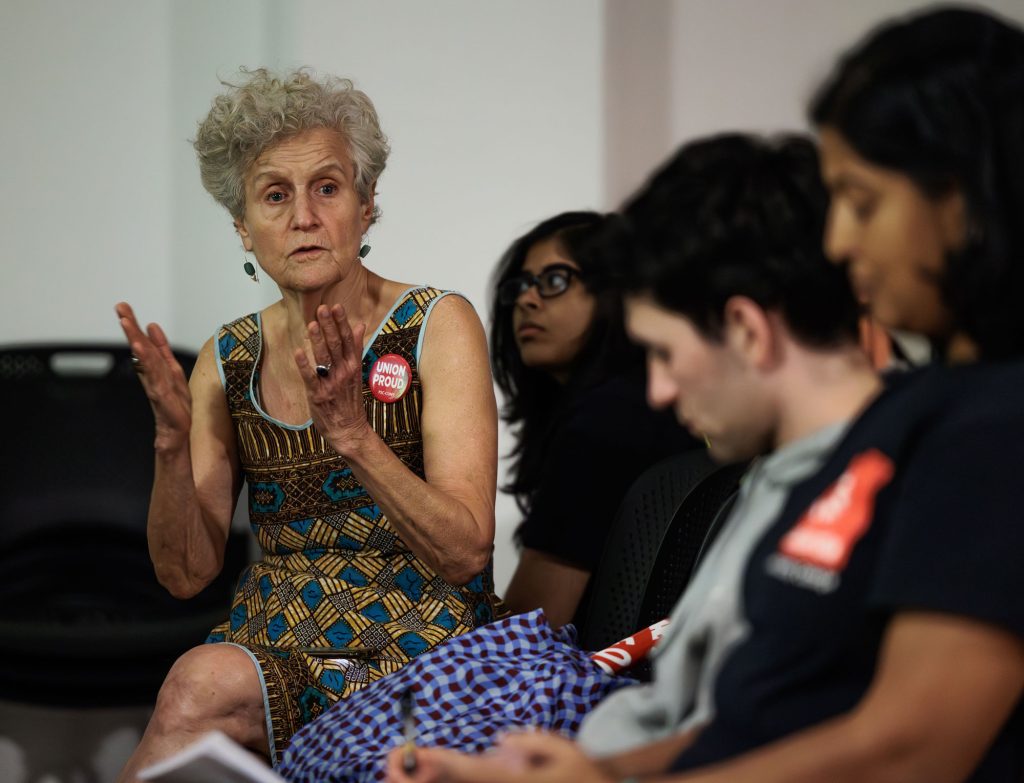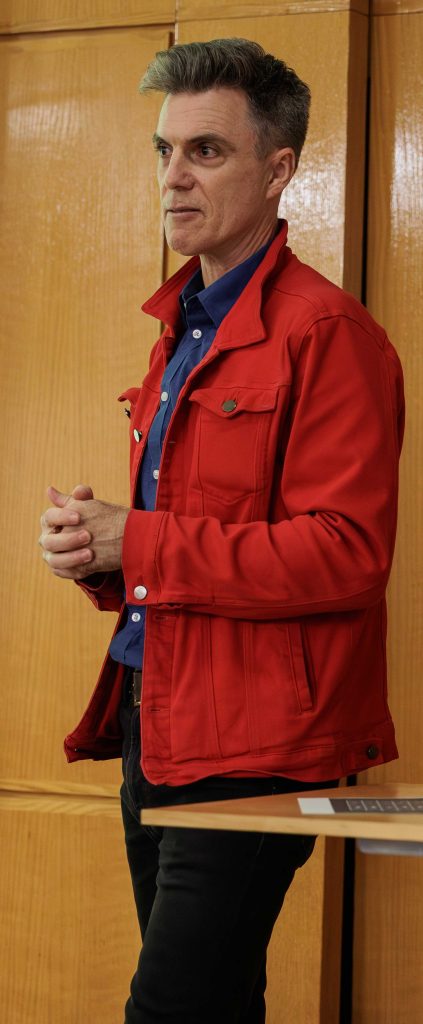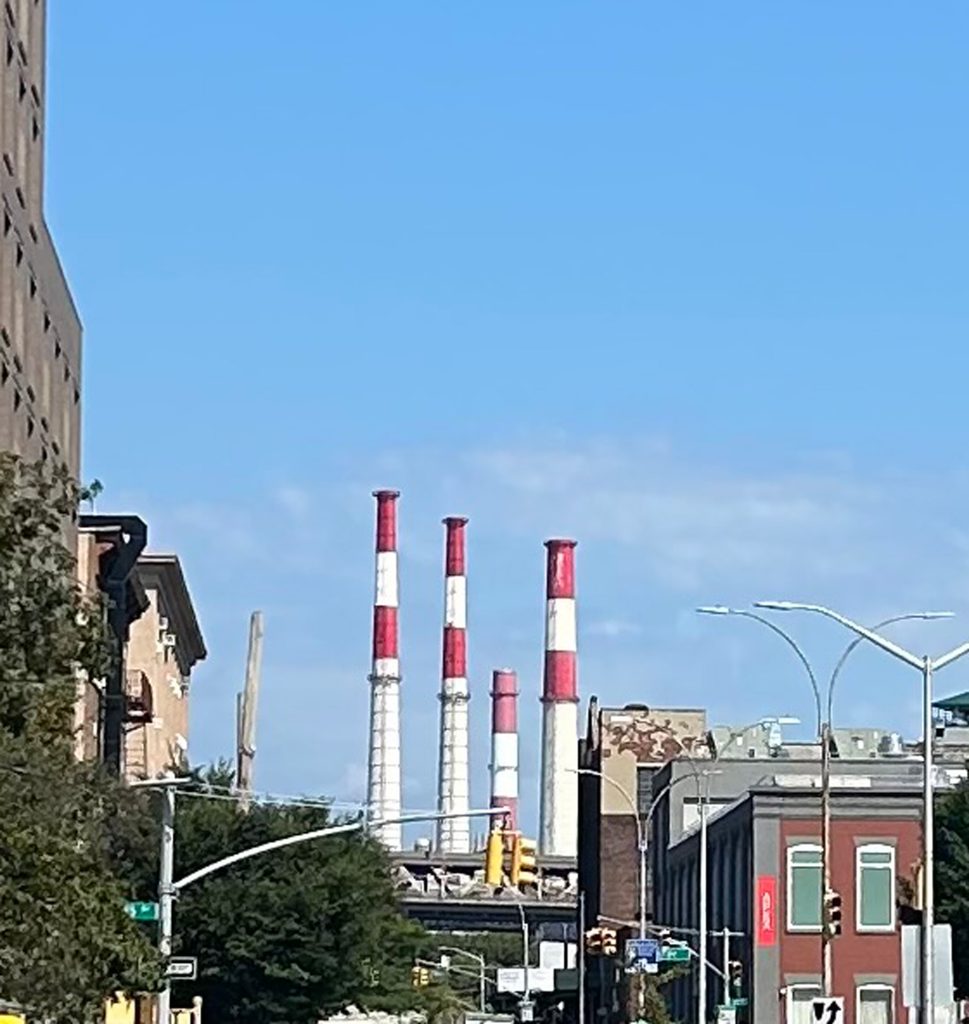New York State can move toward a green energy future with the help of CUNY faculty, staff and students. That was the theme of nearly a dozen “Decarbonize CUNY” events hosted at different campuses this past September.
Activists from the union’s environmental justice committee joined with activists from other community groups to push for a green CUNY – and to replace polluting power generators with green energy.

Nancy Romer of the union’s executive council (credit: Paul Frangipane)
CLIMATE LAW
The story starts in 2023, when the state enacted the Build Public Renewables Act – the “biggest climate law in the nation,” said Sam Balzac of the Democratic Socialists of America and the group Public Power at one of many Decarbonize CUNY events around the city this fall. It mandates the state to move toward 70 percent renewable energy use by 2030, reduce utility bills and create new green jobs.
As The Guardian explained last year, “The Build Public Renewables Act (BPRA) will ensure that all state-owned properties that ordinarily receive power from the New York Power Authority (NYPA) are run on renewable energy by 2030. It will also require municipally owned properties – including many hospitals and schools, as well as public housing and public transit – to switch to renewable energy by 2035.”
But the state, under Governor Kathy Hochul, has fallen behind on these goals. It will take sustained public pressure on the governor in order to meet these climate goals, activists said.
The movement the PSC is helping to build at these Decarbonize CUNY events is one that will put the state’s power generation not only under public control, but also back on the path to a green future.
STATEWIDE ACTION
The campaign to move away from fossil fuels and toward renewable energy is statewide. And in our city, each campus is acutely impacted by fossil fuels in unique ways. One example of this is LaGuardia Community College (LGCC) in Long Island City, Queens.
At the Decarbonize CUNY event at LGCC and the Graduate Center, Ashley Dawson, a distinguished professor of English at the College of Staten Island and the Graduate Center, showed a short film he directed about the impact on the neighborhood of the nearby Ravenswood peaking power plant, or “peaker.” Plants like Ravenswood are only in use for about 100 hours each year, but they are highly polluting, and often located near schools, parks and housing. “Think about the breath you’re taking right now,” he said.

Ashley Dawson (credit: Paul Frangipane)
To be more specific, a 2022 report by the Clean Energy Group said, “Peakers are some of the dirtiest, least efficient and most expensive energy sources, and most of them are located in low-income communities, environmental justice communities and communities of color. Long-term exposure to peaker emissions, such as sulfur dioxide, nitrogen oxides and fine particulate matter (PM 2.5), can cause asthma, Alzheimer’s, heart disease, chronic kidney disease, diminished fertility, miscarriages and other adverse health conditions.”
That is frightening stuff, and it is impacting Queens residents and workers right now, including LGCC faculty, staff and students, Dawson said.
Julie Won, a City Council member whose western Queens district includes LGCC, referred to the section of the borough by the East River as “Asthma Alley,” and said that this movement was about fixing that. “I don’t want to see my children grow up with asthma,” she said.
CUNY CAN LEAD
During another presentation about energy-saving heating methods, Dawson also said that CUNY could be a leader in how public institutions rethink their infrastructure to be greener. “We are organizing to retrofit CUNY buildings,” he said. “We could be a laboratory to make these buildings as efficient as possible.”
Won also reiterated that colleges like LGCC could play a huge role in training students for careers in greener energy, ensuring that the green energy economy is also a job creator. “We are talking with [LGCC] President [Kenneth] Adams about job training,” she said.
CONTRACT TIES
Justin Yulo, the NYPIRG project coordinator for City College, said, “From these Decarbonize CUNY town halls, CUNY faculty, staff and students should absolutely organize and educate their campuses on these improvements to facilities and administration. All while also advocating outside of campus to their elected officials to push for climate legislation that will improve our environment, make our buildings energy efficient and save costs. These dual actions of a united CUNY can lead to decarbonizing our schools and taking action for our planet.”
Nancy Romer, who represents retirees on the PSC executive council and is one of the key organizers of the Decarb events, noted that the PSC’s involvement in this campaign is directly related to the contract fight with CUNY, as the union is pushing for CUNY to agree to reduce its carbon footprint and eliminate single-use plastics.

The Ravenswood “peaker” plant in Queens.
“As part of the PSC’s ‘Support for the Common Good’ in our bargaining, we are demanding that CUNY management be transparent in their plans to achieve net-zero carbon emissions and to report their progress in achieving those goals during campus- and CUNY-wide labor-management meetings,” she said. “We are also connecting our health and safety demands to our environmental demands – again, to be completely transparent in regular reporting of the air quality, water safety and availability, and facilities maintenance on each campus. Further, in view of the availability
of alternatives to pollution-causing, fossil-fuel-based plastics, we are demanding that CUNY provide food service and vending machine offerings that are free of single-use plastics in keeping with New York State law.”
NEED ACTION
Romer continued, “We cannot stand by allowing our University, our workplace, to harm us, our students and our neighboring communities, as well as the planet writ large. Our many campus-based Decarbonize CUNY town hall events are underscoring the importance of environmental justice and health and safety – for all of us to be front and center in our efforts as union members. We are educating ourselves and our students so that we can protect ourselves and advocate for the most resilient and healthiest CUNY possible, and do our share to slow down the potentially ravaging effects of runaway climate change.”
Published: October 29, 2024

